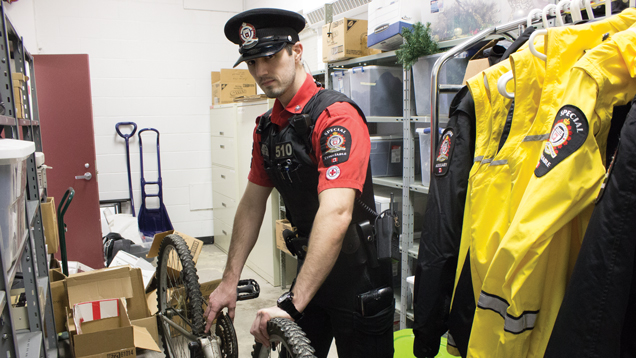Secure your valuables with Campus Security Services
 CREDIT: JESSICA THOMPSON
CREDIT: JESSICA THOMPSONThe serial number on a bike is located underneath it, as special const. Kyle Cutting shows.
Campus Security Services has a launched a property registration database for valuable items intended to assist in the recovery of stolen property.
“It’s open to staff, students and faculty; anybody with access to MyFanshawe can go onto our internal webpage under Campus Security Services and if you have a bicycle, cell phone, tablet, laptop - anything that would be considered personal property is eligible to be registered,” said Luke Edwards, Fanshawe College’s special const.
After registering basic personal information the webpage will “ask you to describe in detail your properties, so as an example if it’s a bicycle, you’re going to specify the make and model, colour of the frame, approximate value at the date of purchase and then at the bottom of the bicycle you’ll find a serial number.”
Serial numbers play a huge role in the usefulness of the database.
“That’s how we identify [it as a] person’s property. So that’s the biggest thing we’re emphasising with this.”
Edwards also emphasized the importance of a receipt.
“If you have a receipt for your item, you can attach that receipt which obviously is further proof that the item would belong to you in the event of a recovery.”
Following the submission of this form, a registration package is prepared which can be picked up at the campus security office.
“In that registration package there’s going to be an asset tag; it’s just a little metallic sticker…the asset tag has a specific number that’s assigned to it… that’s the number that ties that piece of property to you.”
And with that sticker, Edwards suggested putting it right underneath the bike where the serial number is located.
For electronics, Edwards recommended putting asset tags on the inside where the battery is.
Edwards elaborated on the relationship between serial numbers and asset tags.
“[The serial number] just better allows us to identify that as your property,” Edwards said. “If you come to us and you say my cell phone has been stolen, when we go to take the incident report, if you have that serial number it makes it easy for us to upload that number onto the national database.”
If the tag is on the item, it is easier to identify the object as stolen and also to identify who it rightfully belongs to.
“If there’s a tag on there, we have your contact information, we give you a call, you come pick it up, and you’re happy, we’re happy and everyone’s happy.”
Music Industry Arts student Jacob Liddell expressed enthusiasm for the database.
“I think it makes sense, I think it’s about time. I had a hard drive stolen at Humber last year, and I couldn’t get it back at all. If there was something like this, I could possibly get it back easier,” he said.
According to Edwards, the excitement shown by Liddell is mirrored in faculty, staff and students alike at Fanshawe.
“We’ve had a lot of community input; people have been looking for this for quite a while so we’re quite pleased that we have this up and running.”














